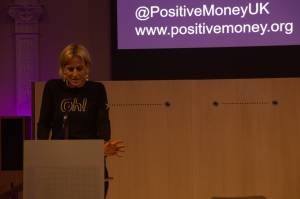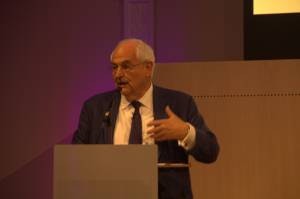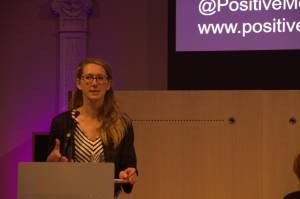Out of the Darkness: Can a reformed financial system solve the world’s biggest problems? (Video)

It has been 10 years since the financial crash of 2007-8 and the dysfunction of our banking system is finally under scrutiny. A recent event for Positive Money on 18th September 2017 saw 200 people gather at the RSA (Royal Society of Arts) to watch a panel do just that. Asking whether ‘a reformed financial system can solve the world’s biggest problems’ were Martin Wolf, Ed Balls and Fran Boait, in a panel debate chaired by Emily Maitlis.
Martin Wolf is the associate editor and chief economics commentator at the Financial Times. He has been a forum fellow at the annual meeting of the World Economic Forum in Davos since 1999 and recently published the critically-acclaimed book, ‘The Shifts and the Shocks: What we’ve learned – and have still to learn – from the financial crisis’.
Ed Balls is a Research Fellow at the Harvard Kennedy School and a Visiting Professor at King’s College London. He was UK Shadow Chancellor from 2011 to 2015 and served as Education Secretary and Minister for Financial Services in the last Labour government.
Fran Boait is the Director of Positive Money, our research and campaigning organisation championing reform of the money and banking system. She previously worked at a number of international organisations including the United Nations, Greenpeace and BP.
Watch a video of the event above, or read the summary below.

Emily Maitlis introduced the debate. Emily is a journalist and presenter on BBC Newsnight. Highlighting that the financial crash was a memorable event for most people alive at the time, she asked a series of questions:
Ten years on, are we at risk of being complacent?
What has changed in that time: politically, socially and philosophically?
Alistair Darling said last week that without the crash, Brexit would never have happened. Would Trump have been elected? Would we have seen the rise in populism that has dominated British politics in recent years?
Was austerity the right response?
And most crucially, has the financial system been properly reformed since the 2007/8 crash?
Martin Wolf delivered the first speech, accompanied by a presentation.

He agreed with Darling’s statement: the crisis was a profound political and social event, not just an economic and financial one. But the history of financial capitalism is of one of crises.
The IMF found 147 independent banking crises between 1970 and 2012. An explosion of crises since the 1970s can be put down to a conflict between what the public wants from money and what financial systems created are able to do. Money stores purchasing power in difficult times, but since 95% of money is actually in the form of a liability, when you need money most, you don’t have it.
In retrospect, the 2008 crash should come as no surprise. The balance sheets of banking assets in the UK in 2009 were 10 times greater than their pre-1970s levels. The response to the crash from the establishment was to tighten regulation and impose tougher sanctions on the type of behaviour that caused the crash. It’s not right to say that nothing has been done in response; but that response was simply an immense amount of bells and whistles to preserve the system we had before. Be it capital requirements or macroprudential regulation, Martin doubted that it would work.
Instead, he lent his support to radical systemic reform such as the Sovereign Money system proposed by Positive Money. The emergence of a highly-regulated, yet cossetted, notionally private, but publicly-backed, financial system is a perversion of a market economy. The banking system is the private beneficiary of a public function: the creation and management of money. We know these reforms are necessary, Martin claimed, and that the Bank of England has the power to implement them. But he ended on a gloomy note, judging the most likely outcome to be continuing deregulation, and the march towards another crisis.
Ed Balls was the next to take to the lectern.

He recounted a story about when he was a Financial Treasury Minister in July 2007. At that time he said to Mervyn King, then chair of the MPC, that we need to know we are equipped to respond to an economic crisis. They acted out a crisis scenario for two weeks to see if they were equipped. He said the exercise showed that they weren’t equipped, and they set to work to try to resolve that.
Six months later, the global crash happened. It was much more complex and international than their scenario; neither the FSA, the BoE or the Treasury saw the underlying trends in the economy. But the reforms that they introduced after it were real and radical. Ed claimed that there is no doubt the populism of current politics is in part a failure of elites to deal with the crisis. But perhaps it is down also to a squeeze on wages that predated the crash, and to wider issues like migration.
With an open mind as to whether the regulatory response was the right decision, Ed shared his concern that even a society where the government – or an all-powerful committee – controls money and manages banks to restrict their actions can’t be sure to have pinned down what exactly passes as money. How can we be sure to have pinned down who creates money? The danger is that this system becomes more destabilising. Moreover, managing such a system would, in Ed’s view, be very technically difficult. Government would have to cast the net really wide. The allocation of public spending and investment etc, are all done by this powerful committee. On this, Ed and Martin, and also Positive Money, disagree.
Some questions for reflection concluded Ed’s talk. If we turned our focus to financial reform, would we be going backwards in terms of international trade? On international tax reform; on cooperation on migration; on finding ways to build new houses? He asked: is financial reform the most important issue? Or do all those other things come before it?
Fran Boait closed the trio of speeches with a talk on the problems we face here and now.

Fran said she was not going to talk that much about Positive Money’s flagship policy: QE for people. But there is a lot of information about this on the Positive Money website.
The following is a full transcript of her speech:
“It’s the year 2017. In the UK wages have seen the worst pay decline since the Victorian era and stagnated for the longest time in 200 years, we have record low interest rates, record high debt to GDP, record high asset prices, a record high current account deficit, a lack of demand, and secular stagnation.
Stock markets are hitting all-time highs, and the number of UK millionaires has shot up by 41 percent over the past five years. Meanwhile, 1 in 8 workers in the UK can’t afford 3 meals a day, low-paid jobs are proliferating and food bank use is soaring.
We are part of a bleak global picture where 1% of people own 45% of the world’s wealth. And to top it off we also have approximately 3 years left until scientists say catastrophic climate change will be unleashed.
There are of course countless more statistics which are both terrifying, and upsetting. These scary stats are all connected and are all symptoms of deep structural issues all around us, and together they paint quite a clear picture of the political-economic system that has dominated over the last few decades breaking down.
One way to understand what is happening is that we are in the midst of a crisis of economic thinking or political economy. 10 years ago the dominant school of economic thought, neoclassical economics, failed spectacularly to predict the financial crash, and then failed to have any answers for why it happened and what to do.
10 years on civil society has responded, organisations like Positive Money, Finance Innovation Lab, and New Economics Foundation have critiqued the financial sector significantly, and leading thinkers have written books about the failure of economics establishment, including Martin’s brilliant book the Shifts and the Shocks, but in the halls of power, in the Bank of England and Whitehall the same thinking that got us into this mess persists.
I was on a panel with a former regulator of the FSA last week, he was there before the crash and talked about how much everyone at the FSA really believed that markets were perfect. Therefore he left because there was no way to get promoted as the regulatory industry was shrinking because you didn’t need to regulate the financial sector because markets are perfect!! Hopefully the idea of financial markets being perfect is kind of absurd to most people in this audience, but it that was pre-crisis orthodoxy in finance and macroeconomics: ideas like Efficient market hypothesis, and Rational expectations hypothesis, and to a great extent, though there is a plethora of evidence to disprove these hypotheses, they still persist.
And the failure to really question financial markets in 2008 and turn the shock of the crash into a programme of reform meant that the financial crisis morphed into a perceived crisis of government spending, which resulted in austerity being implemented across countries supported by multilateral institutions like the IMF and OECD. So the people that suffered the most from the crisis did the least to cause it.
It is clear that the establishment view has reverted at least somewhat to pre-crisis thinking. Mark Carney has made recent statements where he has said that the UK should double the size of the financial sector over the next 25 years, and the UK could ‘become the investment banker of Europe’ after Brexit. The idea that this is somehow in line with the Bank of England’s mission which is ‘to promote the good of the people in the UK’ is completely unfounded.
There is no evidence that a much bigger financial sector, relative to the rest of the economy, has led to an improvement in resource allocation or to better returns for savers and investors. If anything, the opposite appears to have been the case. The financial sector is by its very nature rent-seeking and has grown because it is extracting larger rents from the rest of the economy. This is a cause for concern, not for celebration.
The City’s contribution to growth and jobs is vastly outweighed by financial instability. Where it’s estimated the last financial crisis cost the UK £7.4 trillion. If we look at how much new bank lending goes towards the productive economy, it’s pretty dismal, less than 10% of new loans go towards businesses. The vast majority is lending to property and financial markets, resulting in an economy skewed towards housing bubbles, finance, and asset price inflation, whilst people have to rely on taking on more and more debt to top up falling incomes.
Despite delivering negligible social benefit, our banks enjoy a huge public subsidy. As Martin spoke about, banks have the unique privilege of creating our money, when they make loans.
They’re able to do this in the knowledge that if their loans go bad, the taxpayer will step in to protect citizens’ deposits.
This state protection means that banks can get away with paying depositors almost no interest, despite the fact that banks can charge high interest rates on their loans. The value of this effective subsidy to UK commercial banks is calculated at ~£25bn every year.
When there’s a recession, UK banks stop lending altogether, requiring a massive bail-out to start lending again. While £133bn of taxpayer money was used to bail out banks in the last crisis, the true cost in terms of lost output and jobs has been estimated by at £7.4 trillion
So what can we do? In the UK we are dominated by 5 large shareholder banks, with no duty to serve anyone’s interests but their shareholders.
Who should be holding societies interest first, however, are our public institutions: the Bank of England and the Treasury being key macroeconomic institutions of the state.
There is a sense that the BoE and Treasury understand we can’t go back to pre-crisis finance, hence Mark Carney’s caveat following his bold statements about doubling the size of the financial sector – ‘we need tough regulation’ he hints at a mild understanding that the financial sector should be somehow tamed, but not changed. But there is no sense that the BoE or government are really questioning the purpose of finance.
Positive Money was founded with a radical vision to challenge how money is created. We quickly understood there is a huge lack of knowledge around how money is created and that it’s taboo to talk about it. We all witnessed this misunderstanding during the election where Theresa May told a nurse she couldn’t give her a pay rise stating ‘there is no magic money tree’.
Of course, it’s not just Theresa May’s lack of understanding about the monetary system that means she doesn’t want to give a nurse a pay rise; there is also political ideology at play.
But few people are aware of the two large magic money trees we have: commercial banks when they make loans, and the central bank. Since the crash, the large central banks have been undertaking quantitative easing programmes – where they create vast amounts of money and use it to flood financial markets. The idea is that it should encourage banks to lend into the economy, essentially by ‘trickle down’. But there’s no evidence it’s having much of an effect, and instead it’s literally making the rich richer by boosting asset prices.
Right after the crash perhaps we could forgive the policy as the best tool available in a hurry, but in 2016 when after Brexit the Bank of England restarted QE, increasing the programme to £445 bn, a policy they know results in increased in wealth held by the top 5%, when wealth inequality in the UK is threatening social cohesion. To say that is the best they can do is unacceptable.
We know we need people power to shift the debate, so we immediately started a campaign against the Bank’s QE programme, highlighting issues with corporate QE, where the Bank is picking corporations to buy bonds in. We’ve protested outside the Bank twice, 10,000 people have been involved, and we managed to get the Treasury Select Committee to launch an inquiry into monetary policy, which unfortunately got shelved at the election so we are calling on Nicky Morgan to reopen it.
In these turbulent and highly uncertain times, what is clear is that the most powerful economic institutions, central banks, are not being adequately scrutinised. If what emerges from the breakdown of the current system does not seek to democratise central banks and the financial sector at large, then it is unlikely that a truly fairer, more democratic, and more equal society will emerge.”